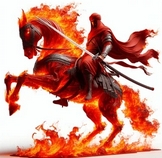
support@yorubalibrary.com
+2348073529208, 07038599574

The Yoruba people of southwestern Nigeria have a rich history filled with legendary heroes who played pivotal roles in shaping their culture, politics, and society. These heroes, through their bravery, leadership, and wisdom, have left lasting legacies that continue to inspire the Yoruba people today. This article highlights some of the most notable Yoruba heroes, including Afonja, Moremi, and Lisabi, and their significant contributions.
Afonja: The Rebel General
Afonja was a powerful Yoruba warrior and the Kakanfo (commander-in-chief) of the Oyo Empire's army. He is best known for his rebellion against the Alaafin (king) of Oyo, which had profound implications for the Yoruba political landscape.
• Rebellion Against Alaafin: Afonja's revolt against Alaafin marked a significant turning point in Yoruba history. Discontented with Alaafin's rule, Afonja sought to assert his independence, which led to a civil war within the Oyo Empire. This conflict weakened the empire and contributed to its eventual decline.
• Foundation of Ilorin: Following his rebellion, Afonja established the city of Ilorin as a powerful military stronghold. Ilorin later became an important center for the spread of Islam in Yoruba land and played a critical role in regional politics.
Moremi Ajasoro: The Brave Queen
Moremi Ajasoro is celebrated as one of the most courageous and strategic figures in Yoruba history. Her legendary acts of bravery helped save the people of Ife from their enemies.
• Sacrifice for Her People: According to legend, Moremi allowed herself to be captured by the raiding forces to learn their secrets. Her intelligence-gathering enabled the Ife people to develop strategies to defeat the afflicters.
• Cultural Symbol of Bravery: Moremi's selflessness and bravery are commemorated in various cultural festivals and monuments. She is honored annually at the Edi Festival in Ile-Ife, where her legacy as a heroine is celebrated.
Lisabi Agbongbo-Akala: The Liberator of Egbaland
Lisabi Agbongbo-Akala is remembered as a liberator and a leader who played a key role in freeing the Egba people from oppressive rule.
• Egba Uprising: Lisabi led the Egba people in a successful revolt against the oppressive rule of the Oyo Empire. His leadership and military prowess were instrumental in securing freedom for the Egba, leading to the establishment of Abeokuta as a strong and independent city-state.
• Promotion of Unity: Beyond his military achievements, Lisabi is also celebrated for his efforts in promoting unity and solidarity among the Egba people. His legacy is honored in the annual Lisabi Festival in Abeokuta, which celebrates his contributions to Egba history.
Shango: The Legendary God-King
Shango, also known as Sango, was a historical Alaafin of Oyo who later became deified as the god of thunder and lightning in Yoruba mythology.
• Reign as Alaafin: Shango was known for his military exploits and efforts to expand the Oyo Empire. His reign is characterized by strong leadership and numerous victories in battle.
• Deification and Worship: After his death, Shango was deified and worshiped as the god of thunder and lightning. His worship is widespread in Yoruba culture, with numerous shrines and festivals dedicated to him, highlighting his enduring influence.
Ogedengbe of Ilesha: The Fearless Warrior
Ogedengbe Agbogungboro was a renowned Yoruba warrior and military leader from Ilesha. He is celebrated for his contributions to the Ijesha people.
• Military Leadership: Ogedengbe led the Ijesha army in numerous battles, particularly during the Kiriji War, where he played a crucial role in defending his people and securing their autonomy.
• Legacy of Valor: Ogedengbe's bravery and leadership are remembered through various cultural expressions, including songs, folklore, and annual celebrations in Ilesha.
Conclusion
The heroes of the Yoruba people, such as Afonja, Moremi, Lisabi, Shango, and Ogedengbe, have left indelible marks on Yoruba history and culture. Their contributions in warfare, leadership, and cultural preservation continue to be celebrated and serve as sources of inspiration. These figures embody the values of bravery, sacrifice, and unity, which are central to Yoruba identity. Through festivals, monuments, and oral traditions, the legacies of these heroes are kept alive, ensuring that their stories continue to inspire future generations.

Learn about the Yoruba concept of Ìwà Pẹ̀lẹ́ (good…

Learn special praises for Divine Being and Creator…